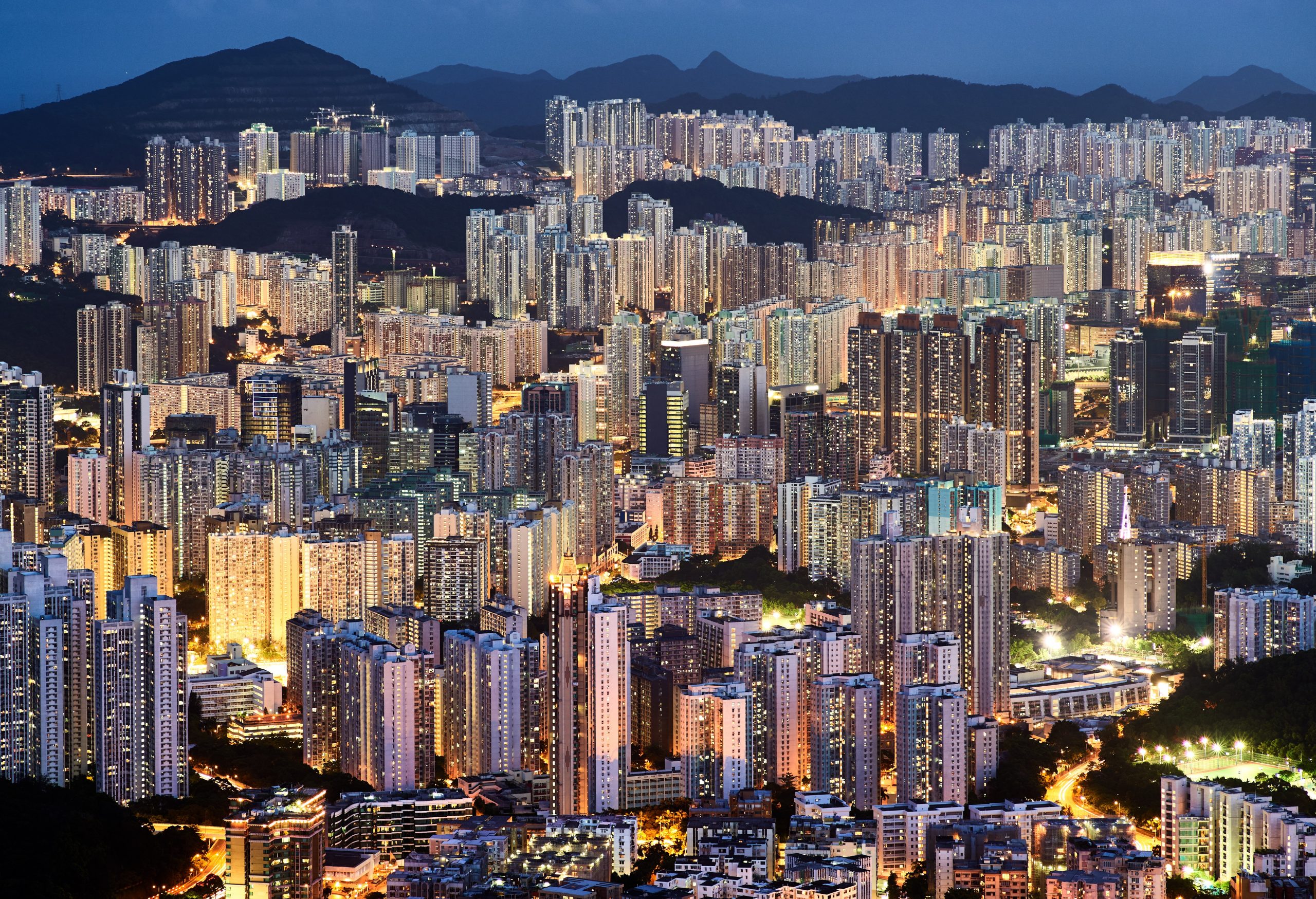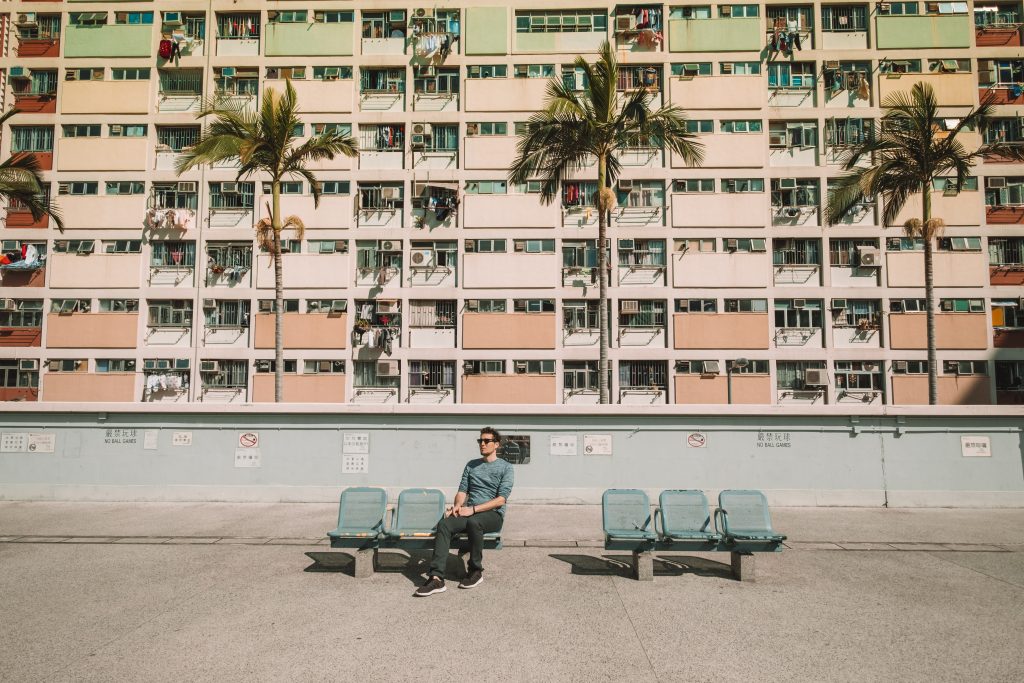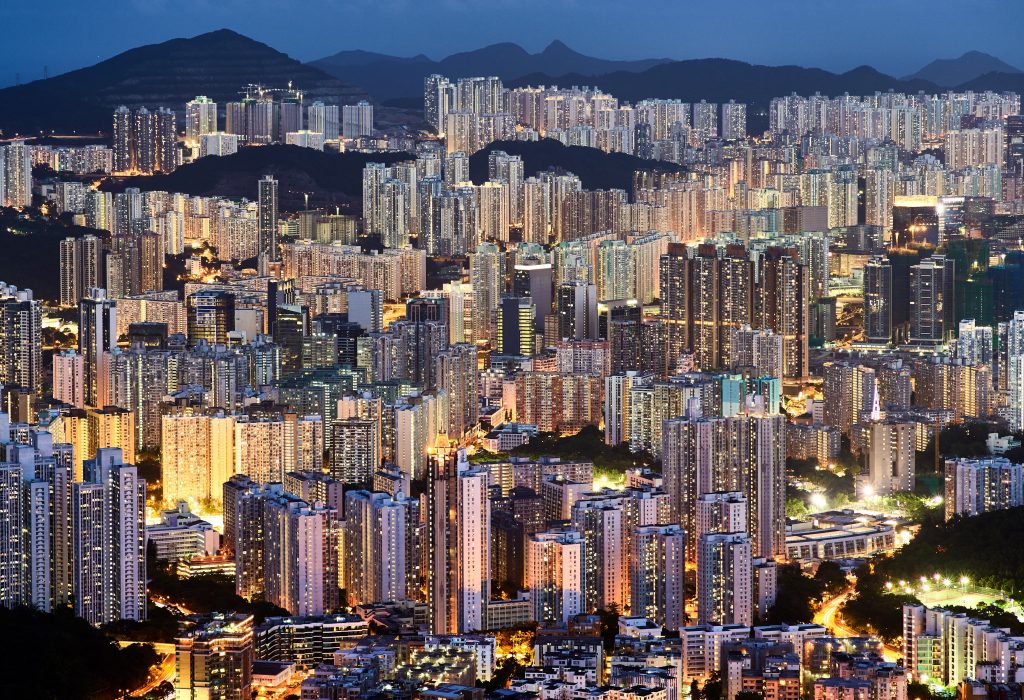Looking at Hong Kong now, it’s difficult to imagine that it was once a lightly populated area of farming and fishing villages. Today, Hong Kong is one of the most significant financial centres and trade ports in the entire world.
Landscape
Hong Kong has the highest number of skyscrapers in the world with 317 towers taller than 150 metres. With no available sprawl space, Hong Kong had to rely on creating high-density residential blocks. It’s very rare to see a single family detached home here. Because of the constant need for new homes, older buildings are being demolished to make space for new modern high rises.
It’s not all a concrete jungle in Hong Kong. The majority of Hong Kong consists of underdeveloped mountains and hills with rugged, tranquil terrain. Given its coastal location, the sea plays a vital role in Hong Kong’s landscape. For travellers interested in outdoor activities, The Upland Countryside Landscape provide some of the most dramatic forms of Kowloon Peak, offering stunning views of the surrounding countryside, cliffs and tranquil beaches.
Gastronomy
Hong Kong is the mecca for culinary delights, offering its visitors an array of delicious dishes from all around the world. Whether you fancy Cantonese, Japanese or French, Hong Kong is the place to visit, as every market will have various items to satisfy your inner foodie appetite. Right up there with Tokyo, Hong Kong deserves to be called one of the top culinary capitals in the entire world.
Culture
Hong Kong is perhaps best described as a delightful fusion between East and West. Hong Kong clings to its traditional Chinese values with a clear emphasis on spirituality, family and education, but it continues to push for economic liberty and progressive rule of law. The city is diverse and has its own distinct identity, influenced by the British-style education and political system. Feng shui is taken very seriously in Hong Kong and this can be noticed through the use of bagua mirrors which are used to deflect evil spirits or the fact that many buildings lack floors with number 4 in them.
Shopping
Hong Kong is a shopping destination where you can find a sheer variety of products for any budget. From markets and stalls with vintage items, through hidden boutiques, to luxury fashion, Hong Kong attracts countless fashion lovers from all around the world. Haggle your way around markets in pursuit of gadgets, kitchen items and Chinese products which will make any shopping experience a bliss.
Know Before You Go
When exploring the city’s concrete jungle, it’s safe to say you’ll be doing a LOT of walking. Comfy shoes are a must, and you can find the perfect pair to suit your style in one of the many shopping districts.
The CBD may look like the ‘New York’ city of Asia. But take a step outside the city, and you’ll be rewarded with breathtaking nature. With over 50 hiking trails to explore, from beaches through mountains, to waterfalls. Hong Kong is actually one of over 230 islands that make up the region. Many of them are easy to reach on day trips and if you have the time, they shouldn’t be missed.
The public transport system in Hong Kong is reliable, efficient, and very affordable. Be sure to buy an Octopus card, which you can use on all transport and convenience stores. Just tap and go! If you choose to hail a cab, avoid the changeover hour (3-4 pm) when they’re in high demand, and it can become difficult to get one. The historical tram makes for a charming journey for a mere 30 cents. It’s also smart to take the convenient Airport Express train from the airport. It’s cheap and takes only 24 minutes.
In summer, the weather outside is regularly hot and humid. Though the inside is always subject to the shock of air conditioning. So make sure to pack layers to streamline from one environment to the next.
Best Time To Visit
The best time to visit Hong Kong’s bustling metropolis is from March to early June and October to December. When the weather is mild, dry, and pleasant. Festival season is in January and February. When the Spring Festival and Lantern Festival light up the streets with joy.
Avoid the first week in October, which is Golden Week. When the locals gather from far and wide and the city becomes crowded and accommodation scarce.
What To Expect
Hong Kong can be a shock to the system, make sure you’re well-prepared thinking about the little things.
Currency – The official currency of Hong Kong is the Hong Kong dollar
Language – The language in Hong Kong is Cantonese. Many often speak English well, as Hong Kong was formerly a British colony.
ATMs – ATM’s are abundant in the city and accept foreign card withdrawals. Most places will accept Visa and Mastercard, and occasionally American Express.
Plugs & Sockets – Hong Kong takes the UK style three-prong plug. The standard electrical voltage is 220 volts AC, 50Hz.
Safety – Violent crime is rare in Hong Kong, but the busy areas can attract a fair share of pickpockets. Be as vigilant as you would in any country. Even the locals love a good photo, so you won’t stick out too much as a tourist.
Climate – Hong Kong sees all four seasons. Summer (June to August) brings hot humidity, and winter (December to February) can get chillingly cold.
Spring (late March to early June) brings rain, and typhoon season rages from early September. An umbrella or raincoat is your best friend.


